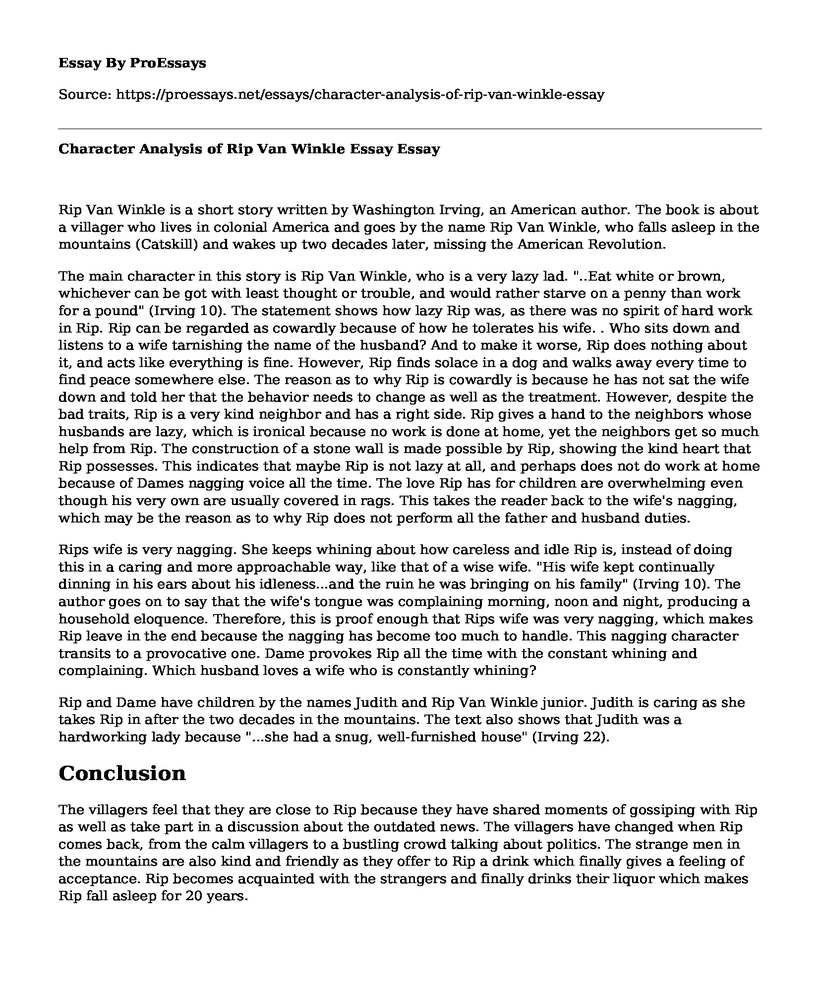Rip Van Winkle is a short story written by Washington Irving, an American author. The book is about a villager who lives in colonial America and goes by the name Rip Van Winkle, who falls asleep in the mountains (Catskill) and wakes up two decades later, missing the American Revolution.
The main character in this story is Rip Van Winkle, who is a very lazy lad. "..Eat white or brown, whichever can be got with least thought or trouble, and would rather starve on a penny than work for a pound" (Irving 10). The statement shows how lazy Rip was, as there was no spirit of hard work in Rip. Rip can be regarded as cowardly because of how he tolerates his wife. . Who sits down and listens to a wife tarnishing the name of the husband? And to make it worse, Rip does nothing about it, and acts like everything is fine. However, Rip finds solace in a dog and walks away every time to find peace somewhere else. The reason as to why Rip is cowardly is because he has not sat the wife down and told her that the behavior needs to change as well as the treatment. However, despite the bad traits, Rip is a very kind neighbor and has a right side. Rip gives a hand to the neighbors whose husbands are lazy, which is ironical because no work is done at home, yet the neighbors get so much help from Rip. The construction of a stone wall is made possible by Rip, showing the kind heart that Rip possesses. This indicates that maybe Rip is not lazy at all, and perhaps does not do work at home because of Dames nagging voice all the time. The love Rip has for children are overwhelming even though his very own are usually covered in rags. This takes the reader back to the wife's nagging, which may be the reason as to why Rip does not perform all the father and husband duties.
Rips wife is very nagging. She keeps whining about how careless and idle Rip is, instead of doing this in a caring and more approachable way, like that of a wise wife. "His wife kept continually dinning in his ears about his idleness...and the ruin he was bringing on his family" (Irving 10). The author goes on to say that the wife's tongue was complaining morning, noon and night, producing a household eloquence. Therefore, this is proof enough that Rips wife was very nagging, which makes Rip leave in the end because the nagging has become too much to handle. This nagging character transits to a provocative one. Dame provokes Rip all the time with the constant whining and complaining. Which husband loves a wife who is constantly whining?
Rip and Dame have children by the names Judith and Rip Van Winkle junior. Judith is caring as she takes Rip in after the two decades in the mountains. The text also shows that Judith was a hardworking lady because "...she had a snug, well-furnished house" (Irving 22).
Conclusion
The villagers feel that they are close to Rip because they have shared moments of gossiping with Rip as well as take part in a discussion about the outdated news. The villagers have changed when Rip comes back, from the calm villagers to a bustling crowd talking about politics. The strange men in the mountains are also kind and friendly as they offer to Rip a drink which finally gives a feeling of acceptance. Rip becomes acquainted with the strangers and finally drinks their liquor which makes Rip fall asleep for 20 years.
Work Cited
Irving, Washington. Rip Van Winkle. 1819.
Cite this page
Character Analysis of Rip Van Winkle Essay. (2022, Jul 01). Retrieved from https://proessays.net/essays/character-analysis-of-rip-van-winkle-essay
If you are the original author of this essay and no longer wish to have it published on the ProEssays website, please click below to request its removal:
- The Overall Synopsis of the Book
- Essay on Why Odysseus Described as One Who Veered From His Path
- Poetry Essay Example
- Tell-Tale Heart Compares to Scarlet Letter: Literary Analysis Essay
- Louise Erdrich's "The Red Convertible" Essay Example
- Essay Sample on Social Class in Pride and Prejudice
- Critical Essay on Imagery in the Death of a Salesman







